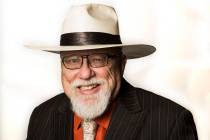Men do just fine as caregivers
Ernest Williams, an 81-year-old Korean War veteran, was so matter of fact about it.
For nearly six years he had bathed and dressed and fed his 76-year-old wife, Inas, who suffered with Alzheimer's disease, the most common form of dementia.
He had also brushed her teeth, combed her hair, sang her songs and kept her from wandering into the street.
When you love somebody who's taken ill, he said, you just do what you can to make her life more comfortable.
In December, while visiting an adult day care center in Las Vegas run by Nevada Senior Services, I had the opportunity to briefly talk with Williams, who had arrived in the early evening to pick up his wife. Only recently had he begun to take his wife to the center off North Jones Boulevard.
"I'm not complaining about taking care of her ---- I would keep doing it all if I could," he said as he walked toward where his wife sat staring blankly at a wall. "But it became too much, and I found this place. I've got hospice coming into the home now, too."
Make no mistake: Caregiving, as we've long known it in America, is changing. While women have long cared for family members at the end of life, much as they care for infants and children at the beginning, men ---- husbands, sons, sons-in-law, brothers ---- are increasingly performing roles that had been traditionally "women's work."
In the past 15 years, studies reveal the share of male caregivers nationwide has doubled, from 19 percent to nearly 40 percent. Because women live longer than men ---- the greatest risk factor for dementia is age ---- men will shoulder even more of the caregiving load in the future.
As I talked with Dr. Leonard Kreisler, whose wife has dementia, the other day, I couldn't help but think about Williams and the changes America is seeing in caregiving. Seldom have we thought in terms of caregivers such as Williams, who talks about the stopping power of an automatic weapon in one breath and about how best to brush out a woman's hair in the next.
Don't tell Williams tough guys can't have big hearts, too.
Kreisler's wife of 55 years, Joan, can still bathe and dress herself, but he now does the cooking, cleaning, driving, shopping, banking, scheduling. Like Williams, his description of what he does is matter of fact ---- he gladly does what he can to make her life as pleasant as possible.
A 2007 study by researcher Richard Russell confirms the behavior of Williams and Kreisler isn't an aberration: "Experiences of the men in the study ... refute the contention that men caregivers merely mow the lawn, fix the car and pay the bills."
What is not in studies is what I find most disturbing when I talk to both male and female caregivers for those with dementia ---- their profound sense of isolation. Often as I worked on an Alzheimer's series published last month in the Las Vegas Review-Journal, caregivers would talk about how they lost contact with people with whom they had long associated, people they now need more than ever since their soulmates have lost the ability to have a meaningful conversation.
For caregivers, the experience is common, noted Susan Hirsch, a social worker with the Cleveland Clinic Lou Ruvo Center for Brain Health.
"People are uncomfortable with the disease, they don't know what to say, so they often stay away," she said.
Kreisler understands the awkwardness many people have, but he says not to worry. Caregivers generally don't want to talk with acquaintances about a loved one's dementia ---- they can do that in support groups, with people in the same situation. No, that's not the kind of conversations so many caregivers hunger for now that a loved one is largely silent.
"We want to talk about politics or sports or the weather or life," he said. "There's nothing to be afraid of. We're just people."
People who could teach us a thing or two about what it means to be truly human.
Paul Harasim is the medical reporter for the Las Vegas Review-Journal. His column appears Mondays. Harasim can be reached at pharasim@reviewjournal.com or 702-387-2908.

















